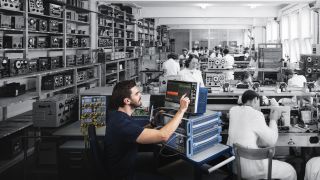Heavy traffic on the big data highway – digital infrastructure is becoming critical infrastructure
Wireless communications are essential for critical infrastructure in an increasingly digital world – as is access to the radio frequency spectrum, the highway for wireless communications and navigation. The spectrum is needed to ensure smooth operation of critical infrastructure such as power grids, emergency management systems, public safety and transport. Without access to the spectrum, communications blackouts could occur, with disastrous consequences. Monitoring and protecting the spectrum is crucial for regulators – and for the well-being of businesses, industry and society at large. Rohde & Schwarz spectrum monitoring and mobile network testing solutions are there to help regulatory authorities and industrial partners.
The uninvited guest from above: detecting and countering radio-controlled drones
Regardless of whether analog, digital or hybrid threats are involved, Rohde & Schwarz has a comprehensive portfolio of monitoring, analysis and security solutions that are highly relevant for critical infrastructures. "One key topic at this time centers around defending against drones. Drones are capable of causing immense damage at a relatively low cost," says Stephan. For example, these silent attackers can be deployed to obtain sensitive information, or they can be equipped with explosives. Margaritis Schinas, European Commission Vice-President, issued the following warning in a press release about the defense strategy against potential threats posed by civilian drones: "Malicious use of drones can pose a significant security risk, especially to Europe's critical infrastructures."
To allow timely and effective airspace protection, Rohde & Schwarz has developed counter drone technologies that are used at events such as G7 summits. The system intercepts the drone's radio link, classifies the signal type, and localizes the pilot and drone. By disrupting the drone's communications, it also interrupts the radio control link. The system is equipped to defend against a wide variety of drone types.
In the pole position for further advances
"Counter drone technologies are very important in a military context," says Stephan. "However, they are also becoming increasingly relevant in civil operations. For example, it is necessary to protect the airspace during events like the Munich Oktoberfest. Thanks to our experience, we are in the pole position when it comes to adapting counter drone technology for major events in a civil context." Counter drone solutions are already in use in civil air traffic control applications. This is an extremely sensitive area where Rohde & Schwarz has been a well-established name for decades. Rohde & Schwarz aviation communications systems are helping to ensure safe air travel at more than 300 airports and flight operations centers worldwide.
Alpha, Bravo, Charlie: perfect communications between pilots and air traffic controllers
Solutions to allow continuous communications between aircraft and the tower are a key element in aviation safety – and thus a foundation of air traffic control. In case of less-than-perfect voice communications, the procedure is very strict: clear the sky. The airspace must be immediately closed. Future-proof communications systems from Rohde & Schwarz use voice over IP for more robust primary and backup communications with advanced capabilities. "One of our specialties involves ensuring resilient communications between pilot and controller," says Stephan.
















